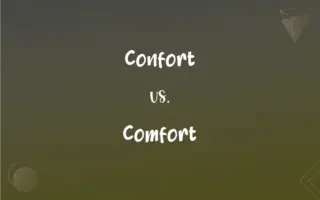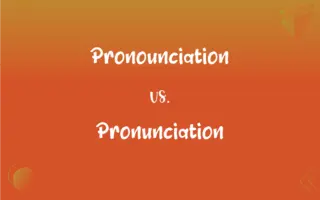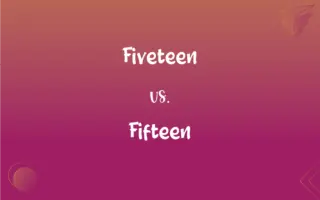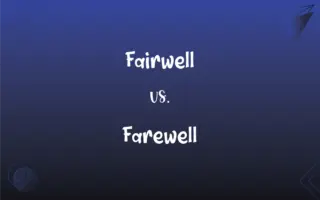Sceince vs. Science: Mastering the Correct Spelling
Edited by Aimie Carlson || By Janet White || Updated on March 9, 2024
"Sceince" is incorrect, while "science" is the correct spelling. Science refers to the systematic study of the structure and behavior of the physical and natural world.

Which is correct: Sceince or Science
How to spell Science?

Sceince is Incorrect

Science is Correct
ADVERTISEMENT
Key Differences
Think of the word 'scissors', which starts similarly to "science".
Visualize 'science' as 'sci' (like 'sci-fi') plus 'ence'.
Remember that 'science' follows the 'c' before 'i' spelling rule, like in 'precise'.
Use a mnemonic: "Scientific Concepts In ENvironment and CElestial studies."
Associate 'science' with 'conscience', which also has a 'c' before 'e' and 'i'.
ADVERTISEMENT
Correct usage of Science
He is very interested in studying sceince.
He is very interested in studying science.
The museum has a new sceince exhibit on dinosaurs.
The museum has a new science exhibit on dinosaurs.
His understanding of sceince has improved significantly.
His understanding of science has improved significantly.
She wants to pursue a career in sceince.
She wants to pursue a career in science.
The sceince fair project took weeks to complete.
The science fair project took weeks to complete.
Science Definitions
A systematically organized body of knowledge on a particular subject.
The science of physics explains the laws of motion.
The pursuit of knowledge and understanding of the natural world.
She dedicated her life to the science of botany.
The study of the natural world through observation and experiment.
Biology is a branch of science that studies living organisms.
A discipline involving the observation of natural phenomena.
Astronomy is the science of celestial objects and the universe.
The application of empirical methods to investigate phenomena.
Through science, we understand how chemical reactions occur.
The observation, identification, description, experimental investigation, and theoretical explanation of phenomena
New advances in science and technology.
Such activities restricted to a class of natural phenomena
The science of astronomy.
A systematic method or body of knowledge in a given area
The science of marketing.
Science Sentences
He won the award for his contributions to environmental science.
The science of astronomy allows us to explore the universe.
Science fiction often imagines the future of technology.
Advances in medical science have saved countless lives.
The students presented their science projects at the fair.
Science helps us understand how the world works.
Environmental science studies how humans impact the Earth.
She's studying marine science to learn about ocean life.
The science teacher demonstrated an experiment with chemical reactions.
In science, hypotheses are tested through experiments.
Forensic science is used to solve crimes.
The museum's science exhibits are both educational and fun.
Understanding the science behind weather patterns is fascinating.
Science magazines often feature articles on the latest research findings.
Science camps are a great way for kids to learn outside of school.
Studying the science of sound is part of learning about physics.
The debate on climate change is informed by science.
The conference covered the latest in space science.
The science of genetics explains how traits are inherited.
She gave a presentation on the science of nutrition.
The science fair encourages students to engage in scientific inquiry.
He's reading a book on the science of happiness.
Science classes in school include biology, chemistry, and physics.
Computer science has led to the development of new technologies.
Agricultural science focuses on improving farming techniques.
Science Idioms & Phrases
Down to a science
Having perfected a method or technique.
She has meal prep down to a science, organizing everything so efficiently.
The science of the mind
Referring to psychology or understanding mental processes.
The book delves into the science of the mind to explain human behavior.
Blind with science
To confuse someone with technical language.
The mechanic tried to blind us with science, but we just wanted to know what was wrong with the car.
Rocket science
Something very complex or difficult to understand.
You don't need to be a rocket scientist to follow these instructions—it's not rocket science.
Science for the masses
Making scientific knowledge accessible to the general public.
His new book aims to be science for the masses, explaining complex ideas in simple terms.
An exact science
A field of study or knowledge with precise accuracy.
Cooking is not an exact science; it often requires intuition and creativity.
Science fiction
A genre of speculative fiction that typically deals with imaginative and futuristic concepts.
She loves reading science fiction novels about space exploration.
The art and science of
Referring to the skill and knowledge required for a particular activity.
Gardening is the art and science of growing and maintaining plants.
The science behind
The explanation or rationale based on scientific principles.
The documentary explores the science behind global warming.
To have something down to a science
To have perfected a technique.
He has the morning routine down to a science, finishing everything on time.
Mad science
Experimental and often unconventional scientific practices.
The movie features a villain who indulges in mad science to achieve his goals.
A science buff
Someone who has a strong interest in science.
As a science buff, she enjoys visiting museums and science centers.
A science geek
Someone who is very interested in science and science-related topics.
He's always been a science geek, fascinated by how things work.
The science of deduction
The method of reasoning and inference, as popularized by Sherlock Holmes.
He used the science of deduction to solve the mystery.
The science of learning
Understanding how people learn best.
The new teaching methods are based on the science of learning.
To turn something into a science
To apply methodical and systematic principles to something typically not considered scientific.
He's turned coffee brewing into a science, with precise measurements and techniques.
Science outreach
Efforts to engage the public in science, often to educate or inspire.
The university's science outreach program includes workshops and lectures for high school students.
Natural science
Sciences that deal with the physical world, such as biology, chemistry, and physics.
He's fascinated by the natural sciences, especially biology.
Political science
The study of politics and government.
She's majoring in political science because she's interested in a career in public service.
Science fair
An event where students present their scientific projects to be judged.
His project on renewable energy won first place at the science fair.
FAQs
What is the pronunciation of science?
Science is pronounced as /ˈsaɪəns/.
What is the verb form of science?
Science doesn't have a direct verb form; it's a noun.
Which vowel is used before science?
The indefinite article 'a' is typically used before 'science'.
What is the plural form of science?
The plural form is 'sciences'.
Which conjunction is used with science?
Conjunctions like 'and' or 'but' can be used with 'science'.
What is the root word of science?
The root word of science is the Latin 'scientia', meaning knowledge.
Is science an abstract noun?
Yes, science is an abstract noun.
Why is it called science?
Science is called so because it comes from the Latin word 'scientia', meaning knowledge.
Is science an adverb?
No, science is not an adverb.
What is the singular form of science?
The singular form is 'science'.
What part of speech is science?
Science is a noun.
What is the third form of science?
As a noun, science does not have a third form.
How is science used in a sentence?
Example: "Science plays a crucial role in understanding the natural world."
Is science a noun or adjective?
Science is a noun.
How many syllables are in science?
There are two syllables in 'science'.
How do we divide science into syllables?
Science is divided as sci-ence.
Which preposition is used with science?
Prepositions like 'in', 'of', and 'about' are commonly used with 'science'.
Which article is used with science?
Both 'the' (definite) and 'a' (indefinite) articles are used with 'science'.
Is science a vowel or consonant?
The term 'science' is neither a vowel nor a consonant; it's a noun.
Is science a collective noun?
Science can be considered a collective noun when referring to collective knowledge.
Is the science term a metaphor?
Science can be used metaphorically in various contexts.
Is science a negative or positive word?
Science is neutral; its connotation depends on the context.
Is science a countable noun?
Science, in general, is uncountable; however, specific fields of study (sciences) are countable.
Is the word science imperative?
No, 'science' is not used as an imperative; it's a noun.
What is the opposite of science?
The opposite of science could be 'ignorance' or 'superstition'.
What is a stressed syllable in science?
The stressed syllable in 'science' is 'sci'.
What is another term for science?
Another term could be 'discipline' or 'field of study'.
Which determiner is used with science?
Determiners like 'the', 'this', or 'that' can be used with 'science'.
What is the first form of science?
As a noun, science does not have verb forms.
What is the second form of science?
Science, being a noun, does not have a second form.
About Author
Written by
Janet WhiteJanet White has been an esteemed writer and blogger for Difference Wiki. Holding a Master's degree in Science and Medical Journalism from the prestigious Boston University, she has consistently demonstrated her expertise and passion for her field. When she's not immersed in her work, Janet relishes her time exercising, delving into a good book, and cherishing moments with friends and family.
Edited by
Aimie CarlsonAimie Carlson, holding a master's degree in English literature, is a fervent English language enthusiast. She lends her writing talents to Difference Wiki, a prominent website that specializes in comparisons, offering readers insightful analyses that both captivate and inform.


































































